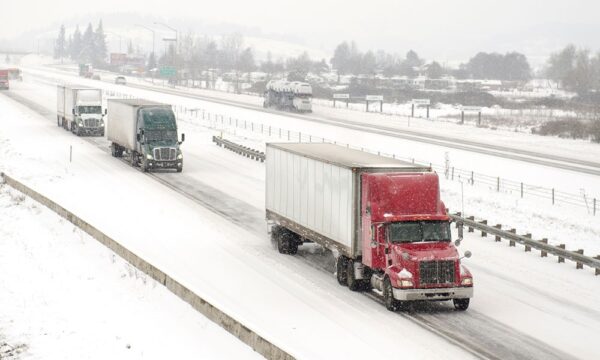
The United States Department of Transportation has agreed to reinstate the allowance of Mexican commercial trucks crossing the border into the U.S. In response, Mexico will lift tariffs imposed on $2.4 billion worth of U.S. products.
This dispute over cross-border long-haul trucks has a more than 15-year history. In 1995, the United States refused to enact the cross-border plan that was agreed to under the North American Free Trade Agreement (NAFTA) and instead banned Mexican trucks from entering the U.S.
In 2007, a pilot program allowed as many as 100 Mexican trucking companies to haul cargo into the U.S., as long as carriers met certain safety rules. When the United States failed to reinstate this program in 2009, Mexico responded by imposing tariffs on 99 U.S. products including apples, wine, ketchup, sunglasses and personal care products. A second round of punitive tariffs was added in 2010 to punish the U.S. government for not resolving the standoff.
The new agreement was signed on July 6, 2011 in Mexico City and requires Mexico to cut tariffs by 50 percent on 99 U.S. products within the following 10 days. The remaining tariffs will be removed after the U.S. Transportation Department authorizes the first Mexican carrier to operate in the United States later this summer.
Rules of the New Agreement
Drivers of trucks crossing the border from Mexico will be tested to verify their ability to understand English and read U.S. traffic signs. Drivers will also have to take regular drug tests and allow for inspection of their driving records.
Additionally, trucks must be equipped with electronic monitoring systems to track drivers’ hours of service and the trucks’ routes.
Trucks will be registered in the U.S. and must submit to inspection every time they cross the border for the first three months. Mexican trucks are restricted from transporting freight between points within the United States. U.S. trucks will follow the same rules in Mexico.
Benefits and Drawbacks
According to U.S. Transportation Secretary Ray LaHood, “The agreements signed today are a win for roadway safety and they are a win for trade.”
Mexico is the United States’ third largest trading partner. The new agreement should relieve financial stress for U.S. farmers and ranchers by alleviating constraints on American products and expanding our exports to Mexico. Without the tariffs, American farmers will be able to compete fairly in the Mexican market.
Owner-Operator Independent Drivers Association, a group with more than 151,000 members of the trucking industry, is untrusting of the agreement. President Jim Johnston questioned why Secretary LaHood went to Mexico to sign the agreement before releasing the details to the public. Vice President Todd Spencer voices concern that allowing Mexican haulers into the U.S. may drive small trucking carries out of business. Another trucking association, Teamsters union,
Safety
The safety of Mexican truck drivers has been addressed much like the safety for American drivers. Training, hours of service regulations, registration of trucks and inspections are all tools used in the United States to make the roads safer for trucks and passenger vehicles alike.
However, Teamster, an occupational union, doubts the safety of the new agreement. Teamsters union President Jim Hoffa said, “Mexican trucks simply don’t meet the same standards as U.S. trucks.” He also charged that U.S. trucking companies are not going to let drivers enter Mexico due to the current dangers from drug violence. In an effort to promote the United States’ agricultural industry, safety on American roads and for Americans on Mexican roads may be compromised.
If you or someone you know has been involved in an accident involving a Mexican or American truck, please contact our experienced lawyers for a free consultation. They will listen to your story, explain your legal rights and options and help you determine the best course for your case.
